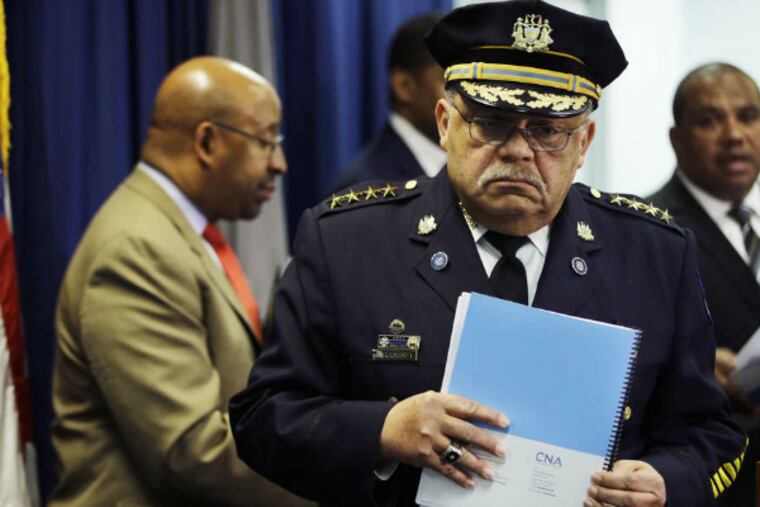DN Editorial: Long blue line of secrecy
For DOJ’s recommendations to be implemented, cop culture must change

THE long-awaited, 174- page report on the Philadelphia Police Department from the Department of Justice released yesterday - which concludes that the department has great deficiencies when it comes to policies and training, especially around the use of deadly force - is thorough, prescriptive . . . and somewhat depressing.
We don't necessarily find the department's problems detailed within the report depressing, nor even the fact that during a period when Philadelphia violent crime has decreased, police-involved shootings have increased. Troubling, yes, but these problems mirror problems with policing across the country that the deadly shootings in Ferguson, Mo., and elsewhere have illuminated.
What is depressing is that the Philadelphia Police Department remains so reluctant to analyze itself, or share information with the public, or claim accountability for police who, because of poor training or contradictory policies, end up killing innocent citizens.
What's depressing is that no supervisor, no matter how well-intentioned, can hope to improve the department without a commitment to the kind of regular data-driven scrutiny that this report provides. How can you change what you don't measure?
Although Police Commissioner Charles Ramsey invited the DOJ to study the department on its use-of-force procedures, the department has long been swaddled in secrecy. Its culture of suspicion and insularity will take more than a report - or even a single commissioner - to change. Until the department can be more open about its operations without being defensive about its failings, nothing will change.
This kind of study should be ongoing and regular. The fact is, though, that nothing like it has been done for more than a decade. In 1996, the Integrity and Accountability Office was created to study and report on such aspects of the department as discipline, training and use of force.
But then-Commissioner Sylvester Johnson had a fit about one of the reports, in 2001, and soon after the office was shut down - and so was any meaningful outside scrutiny.
The Police Advisory Commission is the official civilian-oversight agency, but remains underfunded and powerless to provide the independent oversight needed. In fact, the DOJ report points out that the Police Department refused PAC's requests for access to files and data regarding officer-involved shootings.
The report also describes the PAC as having 19 commissioners; in point of fact, there are now only six. Thirteen vacancies on an oversight board tells you all you need to know about its effectiveness.
Police have among the toughest jobs on Earth, especially in big, complicated cities like ours. But the history of scandal and problems in Philadelphia's department has led to a wide divide between the community and the department, which imperils public safety.
The DOJ report outlines 91 critical recommendations that should help restore trust, and Ramsey has promised to implement the reforms.
The stakes for him - as one of President Obama's chosen leaders on national police reform - are high. But what hope do we have that even nine of the recommendations will be implemented given the department's current self-protective culture?
That the DOJ will be working with the department during the next 18 months is cause for optimism. But that must lead to more serious independent oversight - a critical priority for the next mayor.